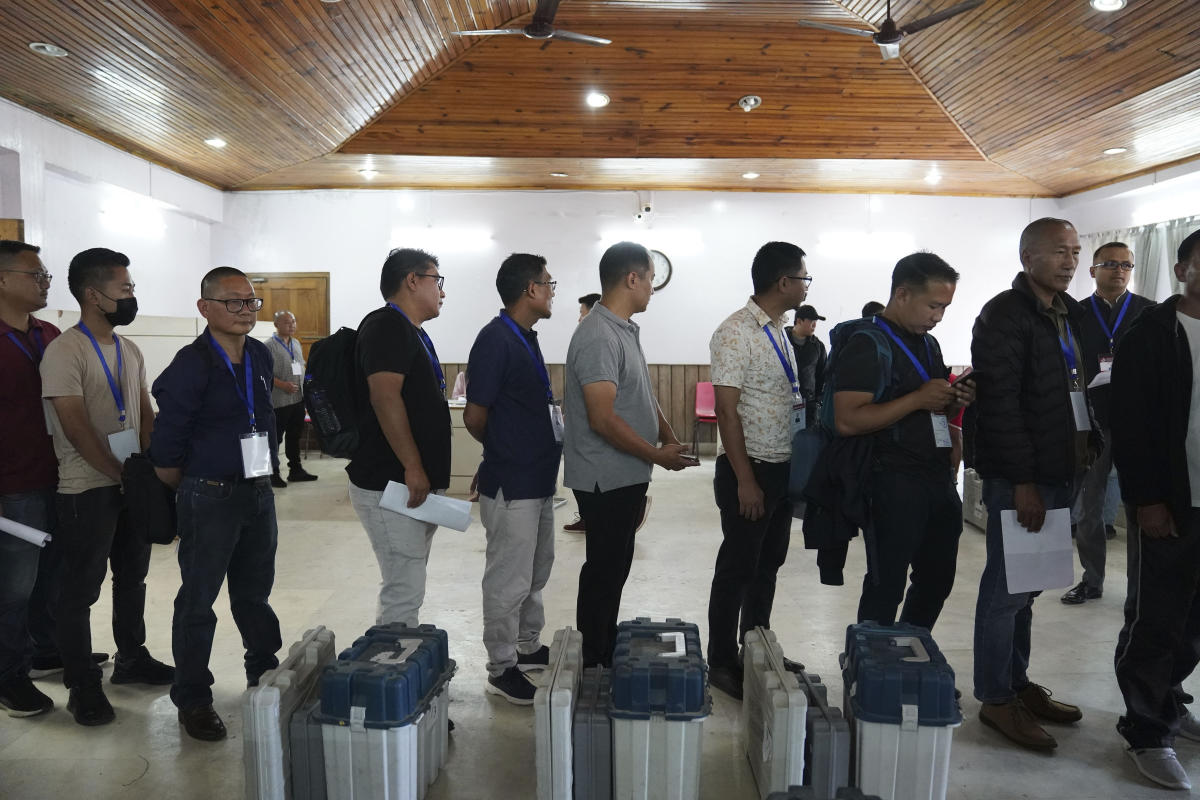NEW DELHI (AP) — Millions of Indians began voting Friday in a six-week election, a referendum on Narendra Modi, the populist prime minister who champions an assertive form of Hindu nationalist politics and is seeking a rare third term as leader of the country. .
Voters queued for hours at polling stations before being allowed in at 7am in the first 21 states where voting was open, from the Himalayas to the tropical Andaman Islands. Nearly 970 million voters – more than 10% of the world’s population – will elect 543 members to the lower house of parliament over five years in staggered elections running until June 1. The votes will be counted on June 4.
These elections are seen as one of the most consequential in India’s history and will test the limits of Modi’s political dominance.
If Modi wins, he will be only the second Indian leader to retain power for a third term, after Jawaharlal Nehru, the country’s first prime minister.
Most polls predict a victory for Modi and his Hindu nationalist Bharatiya Janata Party, who face a broad opposition alliance led by the Indian National Congress and powerful regional parties.
It is not clear who will lead India if the opposition alliance, called INDIA, wins the elections. The more than twenty parties have not yet put forward a candidate, but say they will choose one once the results are in.
The elections come after a decade of Modi’s leadership, during which the BJP has consolidated power through a combination of Hinduism-centric politics and economic development.
Modi has stoked Hindu nationalist rhetoric during his campaign and tried to portray himself as a world leader. His ministers are touting him as the steward of a rising India, while his supporters are celebrating his campaign promise to make India a developed country by 2047, when it marks 100 years of independence.
But while India’s economy is among the fastest growing in the world, many Indians are facing increasing economic challenges. The opposition alliance hopes to capitalize on this and galvanize voters on issues such as high unemployment, inflation, corruption and low agricultural prices that have caused two years of farmers’ protests.
Critics warn that Modi has become increasingly illiberal and that he could use a third term to undermine Indian democracy. His Hindu nationalist policies, they say, have led to intolerance and threaten the country’s secular roots.
The alliance has pledged to halt the democratic shift that India has witnessed under Modi’s rule. They accuse Modi of sidelining elected ministers in favor of trusted bureaucrats and using tax authorities and police to harass critics and opposition parties.
“Modi has a very authoritarian mentality. He doesn’t believe in democracy. He does not believe in parliamentarism,” says Christophe Jaffrelot, who has written about Modi and the Hindu right.
Modi insists that India’s commitment to democracy remains unchanged. He told a meeting of the Summit for Democracy in New Delhi in March that “India is not only fulfilling the aspirations of its 1.4 billion people, but also offering the world hope that democracy delivers and is empowering.”
The Indian leader enjoys enormous popularity among India’s 1.4 billion inhabitants. His BJP dominates in the Hindi-speaking northern and central parts of India, and is now trying to gain a foothold in the east and south to capture a two-thirds majority. Modi and other BJP candidates have repeatedly promised to win at least 400 seats.
The party is hoping for a landslide victory, made possible by its popular welfare programs, which it says have improved access to clean toilets, health care and cooking gas and provided free grain to the poor. Measures such as the construction of a controversial temple to Ram on the site of a demolished mosque, and the demolition of the disputed Muslim-majority region of Kashmir’s former autonomy, may resonate with supporters who hail him as the champion of the Hindu majority.
“Any party that returns for a third term, and with a brute majority, is a terrifying prospect for democracy,” said Arati Jerath, a political commentator.
Modi’s two terms in office have left India’s civil liberties under attack and the country implementing discriminatory policies, critics say. Peaceful protests have been violently suppressed. The once free and diverse press is under threat, violence against the Muslim minority is on the rise and government authorities have arrested opposition politicians on alleged corruption charges.
The BJP has denied that its policies are discriminatory and says its work benefits all Indians.





